May 2021 2nd Edition
May 2021 2nd Edition vuyelwan
Translations
Jobs: Department of Justice and Constitutional Development - April 2021
Jobs: Department of Justice and Constitutional Development - April 2021 UrsulaHead: Justice College (Chief Director)
Ref No: 21/121/JC
Centre: Justice College, Pretoria
Salary: R1 251 183 – R1 495 956 per annum (All inclusive remuneration package).The successful candidate will be required to sign a performance agreement.
Requirements: An appropriate B Degree in Public Administration/Law or equivalent qualification (NQF Level 7) as recognized by SAQA; A Master’s Degree in the above mentioned qualification will be an added advantage; 5 years must be at senior management level; 4 years experience should be in training and education environments.
Enquiries: Ms P Leshilo (012) 357 8240
Applications: Quoting the relevant reference number, direct your application to:
E-mail address: DOJ21-121-JC@justice.gov.za
Chief Director: Constitutional Implementation
Ref No: 21/118/CD
Centre: National Office, Pretoria
Salary: R1 251 183 – R1 495 956 per annum (All inclusive remuneration package).The successful candidate will be required to sign a performance agreement.
Requirements: An undergraduate qualification (NQF Level 7) as recognized by SAQA in law or LLB Degree in Public Law; International Law and Human Rights qualification; 6 years experience in International Law & Human Rights or Public Law; 5 years must be at senior management level.
Enquiries: Ms M Kganyago (012) 315 1844
Applications: Quoting the relevant reference number, direct your application to:
E-mail Address: DOJ21-118-CD@justice.gov.za
Chief Director: Intergrated Justice Systems And Project Management Office
Ref No: 21/107/DG
Centre: National Office, Pretoria
Salary: R1 251 183 – R1 495 956 per annum (All inclusive remuneration package).The successful candidate will be required to sign a performance agreement.
Requirements: An undergraduate qualification (NQF Level 7) as recognized by SAQA preferable in Project Management, Information & Communication Technology and Social Science; At least 5 years in large ICT project environment; 5 years must be at senior managerial level; Knowledge and understanding of the Justice system; A valid driver’s licence. The following will be added as advantages: Post Graduate qualification in relevant field will be a strong advantage; Proven track record of delivery of a high impact modernisation project.
Enquiries: Mr. M Melato (012) 315 1351
Applications: Quoting the relevant reference number, direct your application to:
Email Address: DOJ21-107-DG@justice.gov.za
Chief Director: Legal Services
Ref No: 21/124/LD
Centre: National Office, Pretoria
Salary: R1 251 183 – R1 495 956 per annum (All inclusive remuneration package). The successful candidate will be required to sign a performance agreement.
Requirements: An LLB undergraduate qualification as recognized by SAQA (NQF Level 7) or equivalent qualification; At least 5 years experience as a Senior Manager in a legal environment; Admission as an Attorney or Advocate will be an added advantage; Knowledge of the South African legal system, legal practices and related spheres.
Enquiries: Ms. K. Ngomani (012) 357 8661
Applications: Quoting the relevant reference number, direct your application to:
Email Address: DOJ21-124-LD@justice.gov.za
Director: Administration Support, Office Of The Deputy Director-General: Corporate Services (12 Months Contract Appointment)
Ref No: 21/122/HR
Salary: R1 057 326 – R1 245 495 per annum. (All inclusive remuneration package). The successful candidate will be required to sign a performance agreement.
Requirements: A Degree in Public Administration, Management Studies and Social Sciences at NQF level 7 or equivalent qualification; Post-Graduate qualification (NQF level 8) is an added advantage; A minimum of three (3) years in Public Administration; Minimum of 5 years’ experience at a middle/senior managerial level; Experience in Public Service financial management and Departmental policies and Procedures; Knowledge of Project Management, National Treasury and Department of Public Service Administration (DPSA) policies and procedures.
Enquiries: Mr. J Maluleke (012) 315 1090
Applications: Quoting the relevant reference number, direct your application to:
Email Address: DOJ21-122-HR@justice.gov.za
Director: Administration Support, Office of The Director-General (12 Months Contract Appointment)
Ref No: 21/123/DG /
Centre: National Office, Pretoria
Salary: R1 057 326 – R1 245 495 per annum. (All inclusive remuneration package). The successful candidate will be required to sign a performance agreement.
Requirements:A Degree in Public Administration, Management Studies and Social Sciences, Legal/Law at NQF level 7 or equivalent qualification; Post-Graduate qualification (NQF level 8) is an added advantage; A minimum of three (3) years in Public Administration; Minimum of 5 years’ experience at a middle/senior managerial level; Experience in Public Service financial management and Departmental policies and Procedures; Knowledge and understanding of the South African Legal system; Knowledge of National Treasury and Department of Public Service Administration (DPSA) policies and procedures.
Enquiries: Mr. M Kekana (012) 357 8023
Applications: Quoting the relevant reference number, direct your application to:
Email Address: DOJ21-123-DG@justice.gov.za
Deputy Director: Gender And The Law
Ref No:21/117/DG
Centre:National Office, Pretoria
Salary: R733 257 – R863 748 per annum(All inclusive remuneration package). The successful candidate will be required to sign a performance agreement.
Requirements: An LLB, B.Proc or equivalent qualification at (NQF level 6); 3 years experience in a management position in gender research and related matters.
Enquiries: Mr O Melato (012) 315 1351
Applications: Quoting the relevant reference number, direct your application to:
Email Address: DOJ21-117-DG@justice.gov.za
Closing Date: 17 May 2021
NOTE: Interested applicants may visit the following website: www.justice.gov.za or www.dpsa.gov.za to view the full job specification of the above positions. Interested applicants must submit their applications for employment to the email address specified to each post. The email must include only completed and signed new Form Z83, obtainable from any Public Service Department or on the internet at www.gov.za, a CV with a font size of 10 and Arial theme font, copy of Identity Document, Senior Certificate and the highest required qualification as well as a driver’s licence where necessary. Attachments must be in a PDF format and limited to 10 megabytes. Emails that do not comply with the above specifications will bounce back without reaching the Department. Original/certified copies must be produced by only shortlisted candidates during the interview date. A SAQA evaluation report must accompany foreign qualifications. Applications that do not comply with the above mentioned requirements will not be considered. All shortlisted candidates for SMS posts will be subjected to a technical and competency assessment. A pre-entry certificate obtained from National School of Government (NSG) is required for all SMS applicants. Candidate will complete a financial disclosure form and also be required to undergo a security clearance. Foreigners or dual citizenship holder must provide the Police Clearance certificate from country of origin. The DOJ&CD is an equal opportunity employer. In the filling of vacant posts the objectives of section 195 (1) (i) of the Constitution of South Africa, 1996 (Act No: 108 of 1996), the Employment Equity imperatives as defined by the Employment Equity Act, 1998 (Act No: 55 of 1998) and relevant Human Resources policies of the Department will be taken into consideration. Reasonable accommodation shall be applied for People with Disabilities including where driver’s licence is a requirement. Correspondence will be limited to short-listed candidates only. If you do not hear from us within 3 months of this advertisement, please accept that your application has been unsuccessful. The department reserves the right not to fill these positions. Women and people with disabilities are encouraged to apply and preference will be given to the EE Target.
Tel: 012 315 1111 Private Bag X81, Pretoria, 0001 Momentum Centre, 329 Pretorius Street, Pretoria. www.justice.gov.za DOJCD_ZA DOJCD
Abuse survivor leads community out of poverty
Abuse survivor leads community out of poverty UrsulaHaving the courage to leave an abusive marriage resulted in a Tshwane woman becoming a successful business owner. 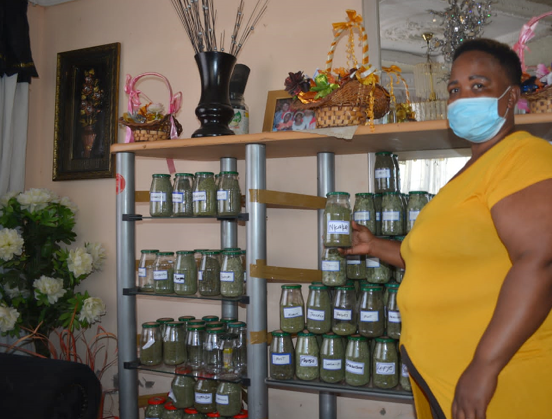
Elizabeth Lehabe (49) from Ramotse in Hammanskraal, Tshwane, left an abusive marriage of 25 years and is now thriving as a businesswoman and community leader.
Lehabe, who is a teacher by profession, is a co-founder and the Chief Executive Officer of the Remogoseo Youth and Women Empowerment Project, which was established in 2013.
“Marriage is not supposed to be a stumbling block in your life but I was in an abusive one for many years. One day I decided to leave and ended up losing my house and cars.”
Lehabe’s life took yet another turn in 2001 when she resigned from her job as a teacher to explore business opportunities.
She worked for a company that sold herbs and became interested in the field.
After improving her skills in farming herbs and running a business, she registered the Remogoseo Youth and Women Empowerment Project, which she runs from her home.
The non-profit organisation provides opportunities to youth and women between the ages of 12 and 75. It is assisted by 72 community members who volunteer their time and skills to fight poverty.
Young members are mostly active in drama, traditional dance, poetry, film production and other forms of art. They also help in agricultural activities, which are mostly attended to by the older generation.
The project also runs various manufacturing projects that use recycled materials to produce firebricks, brooms and beaded jewellery.
“I believe that to defeat poverty, you have to groom young people from an early age and turn them into active citizens who become the change they want to see in their own communities,” says Lehabe.
With the proceeds from their vegetable and herb gardens, Lehabe and members of the project run a soup kitchen that feeds 98 people daily.
The project is a beneficiary of the Gauteng Department of Agriculture, Land Reform and Rural Development.
The department’s Deputy Director for Economic Development, Trade and Marketing, Lerato Molaudzi, says after talking to Lehabe, the department realised that the project needed assistance.
“My colleagues and I helped to submit a sample of her herbs to the Council for Scientific and Industrial Research for approval. We also requested assistance from the Department of Social Development and the Agricultural Research Council, both of which donated food parcels and other essentials to the community and the project,” she says.
You can contact the Gauteng Department of Agriculture, Land Reform and Rural Development at 011 240 2500.
Bank on collaboration
Bank on collaboration vuyelwanA successful entrepreneur will soon be the first woman in South Africa to own a mutual bank.
Nthabeleng Likotsi (36), whose cooperative recently obtained a licence to start a mutual bank, encourages small businesses to collaborate to grow and increase their profits.
Likotsi, from Botshabelo in the Free State, is the founder of the Young Women in Business Network (YWBN).
The network started in 2009 as a cooperative financial institution, but this year turned into a mutual bank after the South African Reserve Bank approved its licence. 
A mutual bank is owned by its members, while a commercial bank is owned by shareholders.
Now called YWBN Mutual Bank, Likotsi says while obtaining the licence was a milestone, there’s still a lot of work to be done.
“There is power in collaboration. When I started YWBN, I understood from day one that I could not do it by myself. The only way for black people in this country to regain their economic strength is for us to collaborate,” she says.
Likotsi, who advocates for black success in business, says black South Africans may have no financial muscle in their individual capacity, but can achieve more if they work together.
Understanding the process of registering the bank was a challenge, as it is not a commonplace procedure; the last bank registered was in about 2001, she says.
As a result, Likotsi needed someone to take the cooperative through the complex process.
“I looked for young, black consultants who were looking for opportunities to register a bank and work with us on the application.
“We registered the bank with consultants who wanted to achieve the same vision, by putting our resources together and applying for the licence. Putting the application together under normal circumstances would have cost us more money,” she says.
Likotsi encourages black, small business owners to use their black economic empowerment (BEE) certificates to access services they need.
“I would walk into white-owned establishments and ask for mentorship and services for free, as this would enable them to earn BEE points,” she says.
Likotsi and her team have been given 12 months to set up the bank. They have to put systems in place and have them tested by auditors before the bank starts operating.
“We have to raise capital. From June, new members can buy shares and become part of the network so that we can capitalise the bank,” she says.
For more information about YWBN Mutual Bank, go to
www.ywbn.co.za
Black industrialists benefit from govt support
Black industrialists benefit from govt support UrsulaOver the past five years, government has invested approximately R32 billion in about 800 black industrialist businesses and black entrepreneurs. 
These investments have taken place through funding initiatives within the Department of Trade, Industry and Competition (dtic).
“This funding has supported the creation of new and dynamic enterprises in a number of critical value chains across all nine provinces, crowding in additional investment from the private sector and created and saved nearly 120 000 jobs,” said Minister of Trade, Industry and Competition Ebrahim Patel.
He was speaking at the launch of the inaugural Black Industrialist Report, which highlights direct funding provided by the dtic, National Empowerment Fund (NEF) and Industrial Development Corporation (IDC) to support black industrialists and entrepreneurs since the programme was launched.
“Black industrialist funding, provided by the dtic and its entities, is creating platforms for a new entrepreneurial class to play its rightful role in boosting industrialisation and fully harnessing the resources of our country."
Reforms through competition law, efforts to improve the ease of doing business and the implementation of the national sector masterplans have also boosted these efforts, the Minister added.
For South Africa to realise its economic potential, the country must embark on a focused and determined effort to transform industries and make them more dynamic and competitive.
“In doing so, we are developing our industrialisation efforts around strategic localisation by boosting domestic demand for South African manufactured goods, and expanding our access to export markets,” he said.
The black industrialist programme has been integrated into the work of the department to realise the objectives of the Economic Reconstruction and Recovery Plan announced by President Cyril Ramaphosa in October 2020.
Commitments have been obtained from social partners at the National Economic Development and Labour Council to reduce reliance on imported goods, and to work with government to develop the country’s productive capacity.
Over the next five years, social partners will look to invest in new industries which can build local industrial capacity by up to R200 billion annually.
- SAnews.gov.za
For more information, call the NEF at 011 305 8000, the IDC at 0860 693 888 or the dtic at 0861 843 384.
Celebrate the diversity of Africa
Celebrate the diversity of Africa vuyelwanAfrica Month, in May, provides an opportunity to celebrate all cultures across the African continent.
If people on the African continent learn to understand each other better and embrace our differences, we can live together peacefully.
May marks Africa Month, and the South African Human Rights Commission (SAHRC) says it is an opportunity for people across the continent to break down barriers.
The SAHRC’s spokesperson, Gushwell Brooks, says Africa Month focuses on nation building and the unity of the African continent. 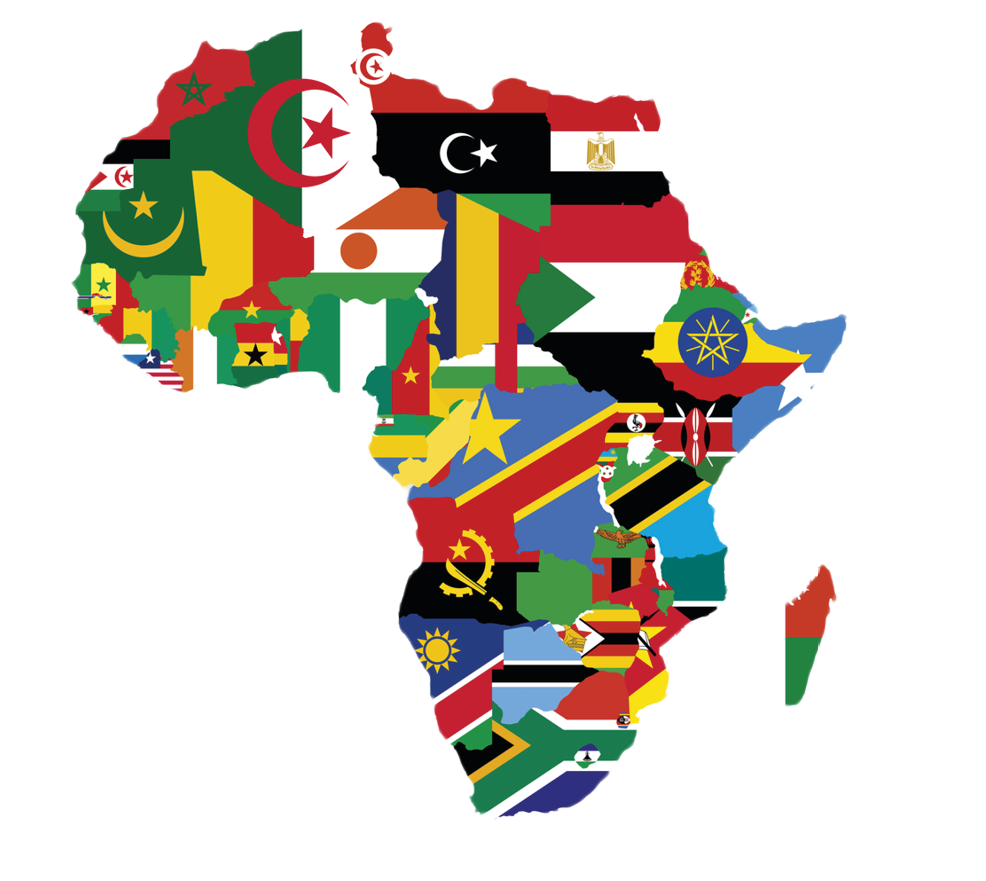
“We can use this opportunity to learn about cultures beyond our own, perhaps by reaching out to people from other African countries to learn about their cultures,” he says.
For example, South Africans can organise community days, which encourage people to dress in their cultural attire and cook traditional foods. These community gatherings will allow South Africans to enjoy conversations with migrants in their communities. He adds that if we recognise our shared African heritage and understand the economic and social difficulties we face as a continent, we can work together to defeat them.
Local businesses and employment groups should also help teach foreign nationals about the minimum wage and other labour rights, so that migrants are aware of their rights and can enforce them.
Brooks says communities need to understand that we shouldn’t discriminate unfairly against anyone.
“We cannot blame all social ills on those different to ourselves. These are problems we share and we thus need to work together to overcome them.”
He urges African citizens to learn from each other to find solutions that will benefit all of us, adding that having foreign nationals in our communities gives us an opportunity to learn new business skills.
Africa Month commemorates the formation of the Organisation of African Unity (OAU) on 25 May 1963. The OAU was succeeded by the African Union (AU) in 2002. The AU is made up of the 55 member states that make up the countries of the African continent.
Child protection is everyone’s business
Child protection is everyone’s business vuyelwanWhile government continuously calls on South Africans to stop the cycle of neglect, abuse, violence and exploitation of children, an even greater focus is placed on protecting these vulnerable members of society during National Child Protection Week.
This year, National Child Protection Week will be commemorated from 30 May to 6 June. The Department of Social Development, in partnership with key government departments, civil society organisations and non-profit organisations that render child protection services, will run a campaign to generate awareness of children’s rights.
Bill of Rights
According to Israel Sekgale, the Social Work Services Manager at Greater Benoni Child Welfare, protecting children from violence, exploitation and abuse is an obligation clearly set out in Section 28 of the Bill of Rights in our Constitution. It states that every child has the right to basic nutrition, shelter, healthcare and social services, as well as the right to be protected from maltreatment, neglect, abuse or degradation.
While children’s rights are also contained in the Children’s Act of 2005 and South Africa has in place progressive policies and programmes to prevent and address violence against children, reducing the high levels of violence against them is one of the country’s major challenges.
The World Health Organisation’s latest statistics show that nearly three out of four children, aged between two and four, regularly suffer physical abuse and/or emotional abuse, and one in five women and one in 13 men report having been sexually abused as a child. 
One of government’s many initiatives to put an end to child abuse is the Gender-based Violence (GBV) Command Centre, a 24-hour facility that addresses a variety of emergencies, such as indecent assault, physical violence, rape and child abandonment.
When Social Development Minister Lindiwe Zulu relaunched the command centre in November, she said it aims to assist the most vulnerable in South Africa, who live each day with the risk of abuse and violence.
“If we do not deal with the issue of GBV house-to-house, street-to-street, community-to-community, we will not be able to take action on the ground,” she said.
What is child abuse?
Sekgale says the signs of child abuse aren’t always obvious.
“A child might not be able to tell anyone what’s happening to them. Sometimes, children don’t even realise that what’s happening to them is abuse.”
There are different types of child abuse and the signs that a child is being abused may depend on the type.
“For example, the signs that a child is being neglected may be different to the signs that a child is being abused sexually,” he adds.
Physical abuse, when a child’s body is hurt, includes hitting, shaking, pushing, choking, punching, painful grabbing and kicking.
Sexual abuse includes sexual acts, the taking or sharing of sexual photos and sexual talk with children.
Neglect is when an adult doesn’t do what is needed to take care of a child, like not providing enough food; and emotional abuse happens when adults judge, threaten, put down, reject and withhold love, making children feel bad about themselves.
Common signs of abuse
Sekgale says some common signs of abuse include:
- Unexplained changes in behaviour or personality.
- Becoming withdrawn.
- Seeming anxious.
- Becoming uncharacteristically aggressive.
- Lacking social skills and having few friends.
- Poor bond or relationship with a parent.
- Knowledge of adult issues, inappropriate for their age.
- Running away or going missing.
“These signs don’t necessarily mean that a child is being abused. There could be other things happening in their life that are affecting their behaviour.
“You may also notice concerning behaviour from adults towards a child, which makes you concerned for the child’s safety and wellbeing. Child Welfare can help you assess the situation,” says Sekgale.
He stresses that parents should always talk to their children about abuse, even if no abuse is suspected.
“This will help children to tell their parents about any abuse they experience. It’s also important for parents to know their child’s normal behaviour, so that they can easily spot a sudden change,” says Sekgale.
Get help:
Any suspicion of child abuse deserves serious attention and fast action.
For help, call the GBV Command Centre at 0800 428 428, send a ‘please call me’ to *120*7867#, add ‘Helpme GBV’ on Skype or SMS ‘help’ to 31531.
You can also contact Child Welfare South Africa at 0861 424 453 or Childline South Africa at 0800 055 555.
Covie community’s successful land claim
Covie community’s successful land claim vuyelwanAs part of government’s effort to accelerate land reform, the Covie community in the Western Cape received 764 000 hectares of land after a successful land claim.
The community lost their land and land rights under the apartheid government in 1978.
Deputy President David Mabuza, in his capacity as the Chairperson of the Inter-Ministerial Committee on Land Reform, presided over the ceremony that handed over the land and title deeds to the community.
The land will positively impact 411 households, providing new opportunities for them to gain financial freedom. 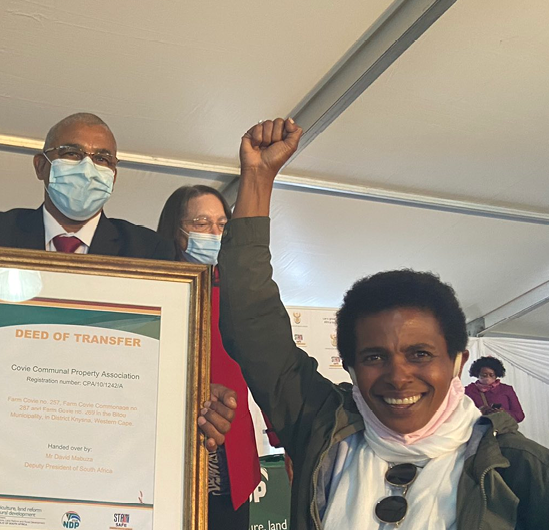
Deputy President Mabuza said the land is rich with agricultural and eco-tourism opportunities.
“We appeal to the Covie community to use this land effectively for heritage purposes, commercial activities and agricultural activities,” he said.
The Deputy President added that government is ready to support the community to ensure the land is used in a sustainable way that will benefit families and the community as well as preserve their heritage.
“The restoration of land ownership to its rightful owners is not only an act of social justice, but it is also a necessary step to unlock the developmental potential of this area.”
Agricultural support initiatives by government will be aimed at improving the productive capacity of restituted land, to ensure that the beneficiaries have access to finances, infrastructure and inputs for crop production.
“Part of the post-settlement support from government will have to focus on the provision of critical service delivery infrastructure such as roads, electricity, water and sanitation to support economic mobility and improved quality of life for the community," said the Deputy President.
In line with government’s District Development Model, national government will work together with the provincial and local government to ensure the full potential of the land is realised.
The land claim was lodged by Irene Bernardo, who is a descendent of one of the original inhabitants of Covie.
“We salute her courageous act, which is a recognition of the prominent role played by women in society, and the affirmation of their equal right to land and its inheritance.
“Her trust in government to respond to the claim and return the land of her forefathers shall remain an act of heroism that will go into the history books,” said the Deputy President.
He added that Bernardo's actions showed that women have been and remain at the forefront of the efforts to attain freedom.
– SAnews.gov.za
Door to home ownership opened
Door to home ownership opened vuyelwanIf are looking to buy a home or property for the first time, you can apply for financial assistance from the Finance Linked Individual Subsidy Programme (FLISP).
The government programme encourages home ownership for those who earn between R3 501 - R22 000 per month.
The FLISP offers financial assistance which can be used as a deposit or to reduce the bond balance. The once-off assistance ranges from R27 960 to R121 626, depending on the level of household income.
To qualify for the subsidy, applicants must have been approved for a home loan by an accredited banking institution or a non-bank financial institution.
Human Settlements, Water and Sanitation Minister Lindiwe Sisulu says: “We have designed this subsidy to assist low income workers both in the private and public sectors. 
“This subsidy is to encourage home ownership among our teachers, factory workers, receptionists, nurses and police, amongst others.”
The Minister added that a budget of R461 million, which is expected to benefit 7 600 qualifying beneficiaries and leverage about R3.2 billion from private sector financial institutions, has been set aside for this financial year.
“Our resolve to restore the dignity of our people through human settlements goes beyond us giving fully subsidised houses to the indigent.
“We are also committed to responding to the housing needs of our middle-income earners through FLISP. We call on our people to seize this opportunity and apply for financial assistance,” says Minister Sisulu.
During the 2020/2021 financial year, the Human Settlements Development Bank processed 2 815 applications. Of these, 2 120 were approved with a total value of R111 million.
Progress has also been made in developing policy to enable non-mortgage applicants to benefit from the programme.
The Minister says the programme is at an advanced stage and is expected to be concluded in the next few months.
“This will see people mainly in the rural areas applying for financial assistance to add to their home loans to build their own homes.”
The National Housing Finance Corporation will sign a number of service level agreements with banking institutions, and a Memorandum of Understanding with the Banking Association of South Africa, once policy is approved. - SAnews.gov.za
For more information on FLISP, call 0860 011 011 or go to www.nhfc.co.za
Fathers can claim UIF parental benefit
Fathers can claim UIF parental benefit UrsulaFathers can take 10 consecutive days of unpaid parental leave after the birth of their child and claim UIF benefits. 
Did you know that qualifying fathers can claim parental benefits from the Unemployment Insurance Fund (UIF)?
The UIF started processing claims for contributing and qualifying beneficiaries for parental benefits in November 2019.
According to the UIF, the benefit followed President Cyril Ramaphosa’s signing of a proclamation to provide parental benefits in terms of the Unemployment Insurance Act.
On 27 November 2018, the President signed the Labour Laws Amendment Act (LLAA) into law, which effected amendments to the Basic Conditions of Employment Act in a number of areas, including parental leave, adoption leave and commissioning parental leave. This also effected amendments to the Unemployment Insurance Act of 2001.
In terms of the LLAA, an employee is entitled to 10 days parental leave upon the birth of the employee’s child.
The law states that parental leave may also be applicable where an employee legally adopts a child or when a child is placed by a court in the care of a prospective adoptive parent.
On 23 December 2019, the President announced the commencement date for parental leave, adoption leave and commissioning parental leave (this relates to surrogate motherhood) from 1 January 2020. The LLAA then introduced the new leave entitlements, including parental leave.
According to the department, fathers can take 10 consecutive days of unpaid parental leave after the birth of their child. However, they must first apply for leave from their employers to be eligible for the benefit.
“They will not receive a full salary during the 10 days’ leave. The employees must be registered and contributing to the UIF to qualify, and the claim is calculated on a flat rate of 66% of the contributable remuneration,” the department explains.
“Male and female employees may qualify for parental leave, depending on the circumstances. However, if the employee gave birth to the child, she won’t qualify for parental leave because she is already entitled to four months’ maternity leave.”
The department says contributors will not be entitled to parental benefits if they were not employed and contributing to the UIF for 13 weeks prior to applying.
If you are a contributing and qualifying beneficiary, all you need to do is visit any Labour Centre to submit relevant documents.
More information, supporting documents and forms are available at www.labour.gov.za
From homeless job seeker to budding entrepreneur
From homeless job seeker to budding entrepreneur UrsulaJosua Juwele (21) was looking for a job when the Coronavirus (COVID-19) pandemic hit South Africa last year. As a result of the devastating effects of the pandemic, he landed up homeless on the streets of Johannesburg. 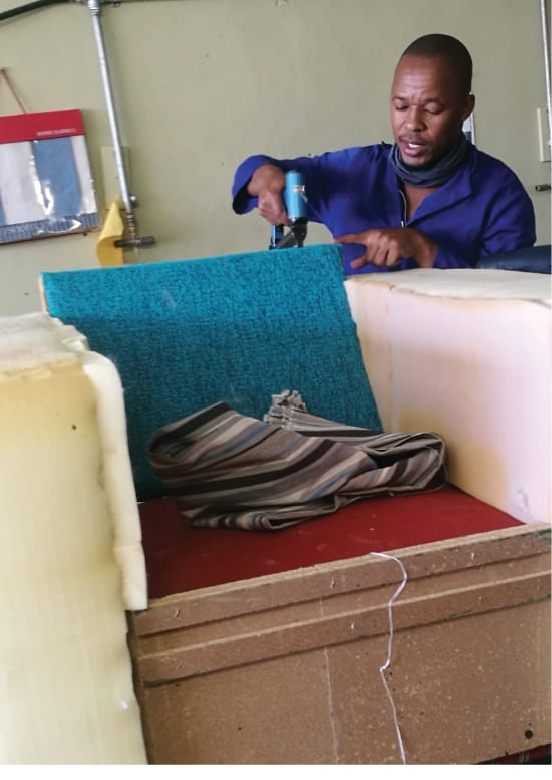
But thanks to the help offered by the Gauteng Department of Social Development and the Small Enterprise Development Agency (Seda), Juwele now fixes sofas for a living.
It all started in March 2020, when President Cyril Ramaphosa placed the country in national lockdown.
Juwele, who is originally from Upington in the Northern Cape, had no option but to move out of his friend’s Randburg home to a homeless shelter as he had no money.
“I lived with my friend since 2018, trying to find a job. He assisted me with money for transport for interviews, but when the country was put in lockdown, I could not impose on him anymore,” he explains
Juwele then heard an announcement from the department on the radio that said homeless people in Gauteng would be offered shelter during the lockdown.
“I stayed at a shelter in Bezuidenhout Valley and moved to Hillbrow in mid-September,” he says.
As part of an exit plan for those at the shelters, Juwele enrolled in the five-day entrepreneurship training programme run by the department and Seda. He was taught how to draw up a business plan and learnt about public relations and customer care.
Juwele later enrolled in an upholstery course that taught him to fix sofas and now plans to register a business. “I am going to start an upholstery shop,” he says.
With money he makes from the shop, Juwele wants to complete his psychology studies at the University of South Africa.
“I want to be a social worker. I have witnessed how proactive and directly involved they are with people at shelters,” he says.
For more information about skills development training programmes, contact the Gauteng Department of Social Development at 011 355 7600 or approach your closest homeless shelter.
GBVF: Men and boys take a stand
GBVF: Men and boys take a stand UrsulaSocial Development Deputy Minister Hendrietta Bogopane-Zulu is encouraging men and boys to champion the fight against gender-based violence and femicide (GBVF). 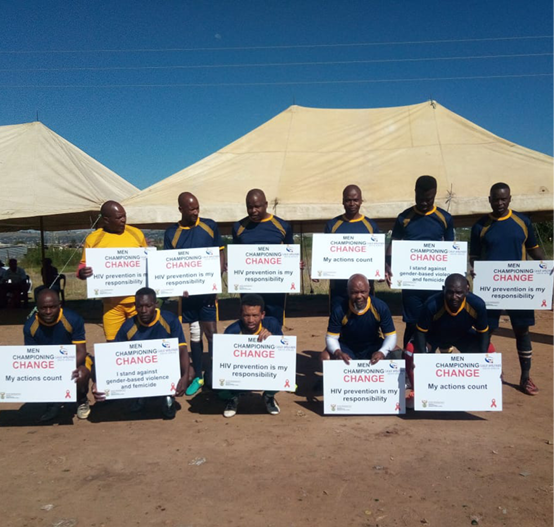
The department’s Men Championing Change Programme forms part of the Takuwani Riime Men’s Movement that was launched through the Men’s Parliament Programme of Action.
Takuwani Riime is a TshiVenda expression, meaning ‘let’s stand together’.
Following the Men’s Parliaments in 2018 and 2020, the programme was rolled out in 52 district municipalities across the country.
“We are now taking the programme to the deepest rural areas of the country, by partnering with the National House of Traditional Leaders.
“This is an ongoing programme which we hope to use as a tool to mobilise South African men and boys to become solutions to social challenges, such as GBVF,” says Deputy Minister Bogopane-Zulu.
The programme aims for men of stature, who are positive influences in the community, to mentor boys and advance gender equality.
Its main goal is to create an enabling environment in which men can have dialogues and inspire positive values relating to sex, gender and sexuality.
According to Dr Matome Kganakga from the South African National AIDS Council (SANAC) Civil Society Forum, the organisation’s ‘men sector’ collaborates with the Department of Social Development on issues such as GBVF, AIDS and TB.
He says the programme aims to bring about a group of men and boys who are responsive to their health needs and are protective and productive in society.
“The programme promotes positive masculinity, which depicts men as protectors of society, particularly of women and children.”
It aims to inspire men to use their power to become agents of social change.
“The ultimate goal of the programme is to develop a strong front of men who educate other men and inspire positive change that subsequently results in socio-economic development; men’s health, including the prevention of new HIV infections; and [the reduction of] violence against women and children and violence in general,” he adds.
The Men’s Parliament Programme of Action coordinates the programme to reach men’s and boys’ formations across the country.
To find out more about the programme or to participate, call 081 802 9180 or go to www.takuwaniriime.org
High hopes for vaccination programme
High hopes for vaccination programme vuyelwanEvery adult in South Africa will have the opportunity to be vaccinated against the Coronavirus (COVID-19) pandemic.
President Cyril Ramaphosa said government aims to vaccinate about 40 million people through its vaccination programme.
He assured South Africans that an effective vaccination programme is in place and vaccines will be made available to people across the country.
Responding to questions in Parliament recently, the
President said the vaccination programme is an unprecedented process.
This will be the first time in South Africa’s history that a national vaccination programme aimed at adults will be rolled out. 
“It is going to reach into the real heart of our country, in the rural areas, in the urban areas, and all over,” he added.
The Preisdent said government will spare no cost to protect South Africans from the pandemic.
“When it comes to ensuring the health our people by providing vaccines, the South African government is going to make sure that we pull out all stops and we will provide the finanaces to do precisely that.”
Government is committed to ensuring that every person 18 years and older will be able to be vaccinated, free at the point of vaccination.
“The costs will be covered from public funds for uninsured people and medical aids for those who are insured, as part of prescribed minimum benefits,” said President Ramaphosa.
Electronic Vaccine Data System
Every person to be vaccinated must register on the Electronic Vaccine Data System (EVDS), after which they will receive details of the date and time of their vaccination.
President Ramaphosa de-scribed the EVDS as the backbone of the vaccination programme.
“The EVDS provides an end-to-end solution that is used to digitally capture each event in the vaccination process and provides data to monitor all vaccinations administered,” he explained.
Government has put measures in place to ensure that all South Africans are able register on the system.
“As many South Africans do not have access to the internet, both digital and walk-in systems will be used for registration, and people can also register on a toll-free helpline.”
Vaccination phases
The President said the first goal of the vaccination programme is to rapidly reduce the number of people who get very sick or die from COVID-19.
The second goal is to achieve ‘population immunity’.
“It is estimated that population immunity will be achieved when around 67% of the country’s population has achieved immunity.This amounts to around 40 million people,” he explained.
The magnitude of the vaccination programme requires dedicated staff at national, provincial and district levels.
“Based on the experience of Phase 1, staffing requirements and norms for vaccination sites have been estimated to guide planning, budgeting and recruitment. These norms may vary depending on the specifics of particular sites,” the President said.
Evidence shows that age is the factor most strongly associated with the severity of COVID-19. For this reason, Phase 2 of the vaccination programme will target all people over 60.
“At the same time, it will target people of 40 and older in vulnerable settings, such as frontline workers,” explained the President.
Phase 3 of the vaccination programme will target the rest of the adult population.
Vaccination sites
A range of vaccination sites have been identified across the country, including primary healthcare clinics, community pharmacies, general practitioners, public and private hospitals and travel clinics, among others.
“Vaccinations will also be done by mobile teams, at mass vaccination sites set up at conference centres and other facilities, and in some workplaces, such as government departments, mines and factories.”
By the end of April, the Department of Health had enrolled 3 357 accredited vaccination sites.
The first shipment of the Pfizer vaccine arrived in South Africa in early May.
“Government has now finalised contracts for sufficient vaccine doses to vaccinate 41.5 million people.
“The estimated times for the delivery of the vaccines depends on several factors, many of which are beyond our control,” the President said.
The contractual delivery schedule is as follows:
In quarter two of 2021:
- 3 million J&J doses.
- 4.5 million Pfizer doses from the contract with Pfizer.
- 1.4 million Pfizer doses from the Covax facility.
In quarter three of 2021:
- 9.1 million J&J doses.
- 8.5 million Pfizer doses
In quarter four of 2021:
- 19.1 million J&J doses.
- 7 million Pfizer doses.
In total, South Africa is schedule to receive:
- 31.2 million J&J doses.
- 21.4 million Pfizer doses, including the Covax allocation
Home-made jam spreading success
Home-made jam spreading success UrsulaAn entrepreneur is reaping sweet benefits from his grandmother’s jam recipe. 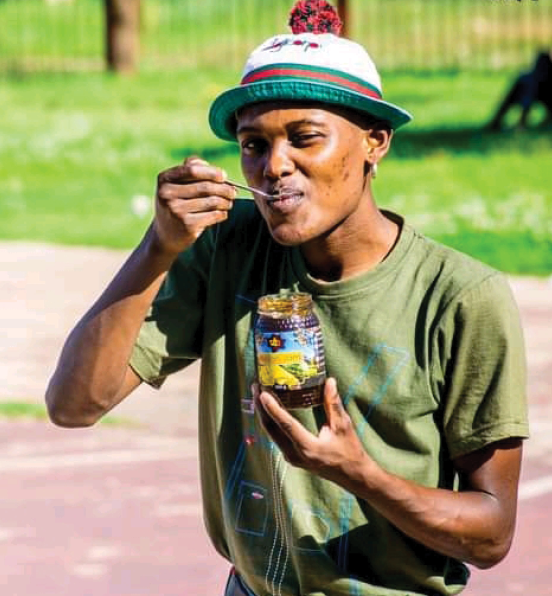
When Gontse Selaocoe’s grandmother used home-grown tomatoes to make jam, he watched with interest. Today, he is a budding entrepreneur, thanks to her delicious jam recipe.
Selaocoe (22), from Orange Farm in Soweto, is the owner of All Day Jam, which has gained popularity in his community.
After his grandmother taught him how to make jam, he commercialised the recipe and harvests most of the ingredients from his garden.
“I used to help my grandfather work in the garden. When it was time for harvesting, my grandmother used to make tomato and yellow melon jam for my siblings and me,” he says.
When Selaocoe was in Grade 11, he took part in the Step Up 2 Start-up competition, an initiative between the National Youth Development Agency (NYDA) and Primestars Marketing, which took learners to cinemas to watch entrepreneurship-inspiring movies and supplied them with resources to come up with a business idea.
“My dreams began manifesting when I took part in the competition. When I shared my idea for the jam business with my grandmother, she supported me from day one, educating me and assisting in the kitchen.
“After completing matric, I started All Day Jam. The business was influenced and motivated by my grandmother,” says Selaocoe.
He now makes four jams – pear, melon, tomato and peach – but has plans to grow the business.
“I am working very hard to distribute my jam to those who know about it. I’m looking forward to growing my market, getting land and equipment and a bigger place to cook and store the jam,” he says.
Selaocoe’s advice to youth is to research agriculture and agro-processing. “There are lots of opportunities in the agriculture sector and lots of products young people can make to grow the economy.”
He says youngsters should make a start despite limited resources because if they wait for everything to first fall into place, they will never get their dreams off the ground.
To find about NYDA programmes, contact the NYDA at 087 1586 345 or go to www.nyda.gov.za
Importance of immunisation
Importance of immunisation vuyelwanWhile the world is focused on new vaccines to protect against the Coronavirus (COVID-19) pandemic, the Department of Health says it is important to ensure that routine vaccinations are not missed.
“In South Africa, about 298 935 children missed their routine immunisation since the beginning of the COVID-19 lockdown, which suggests that they might be vulnerable to childhood diseases,” says the department.
Missing routine vaccinations leaves children at risk of serious vaccine preventable diseases including measles, polio, whooping cough, tetanus, diphtheria, hepatitis B, TB, haemophilus influenza, diarrhoea and pneumococcal infections, which claims hundreds of millions of lives.
The department has partnered with various stakeholders to embark on a countrywide immunisation catch-up drive to ensure that children are up-to-date with their immunisation schedule. 
This is especially important for those who missed routine vaccines and other child health services as a result of interruptions caused by COVID-19.
“Immunisation saves millions of lives every year and is widely recognised as one of the world’s most successful health interventions.
“In this context, this year’s campaign will aim to build solidarity and trust in vaccination as a public good that saves lives and protects health,” says the department.
To ensure the safety of children and healthcare workers, parents, caregivers and other community members must comply with all COVID-19 protocols when visiting health facilities for child immunisation and other health services.
If your child has missed any of their routine immunisations take him or her to your local clinic for further assistance.
- SAnews.gov.za
J&J and Pfizer vaccines for SA
J&J and Pfizer vaccines for SA vuyelwanSouth Africa will rely on the Johnson & Johnson (J&J) and Pfizer vaccines to protect citizens from the pandemic for now.
So far, government has secured 31.2 million J&J doses and 21.4 million Pfizer doses.
“Currently, the Pfizer and J&J vaccines have been registered by South Africa’s Health Products Regulatory Authority (SAHPRA) and have been selected for procurement,” said President Cyril Ramaphosa.
The first shipment of the Pfizer vaccine arrived in South Africa in early May.
However, the delivery of the J&J vaccines to South Africa was delayed in early May. 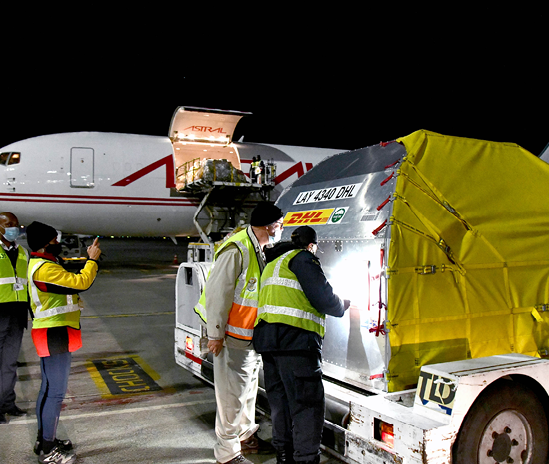
Responding to questions in Parliament, the President explained that the United States medicines regulatory body, the FDA, issued a directive to J&J after an inspection at one of J&J’s manufacturing partner’s facilities raised concerns.
The J&J vaccine is being used to vaccinate healthcare workers after it was found to be effective against the new variant of the virus in South Africa.
“The vaccination process was interrupted briefly when the FDA halted vaccination using the J&J vaccine in mid-April because of extremely rare, yet severe, blood clots experienced by some people who were vaccinated, resulting in the deaths of a few people,” the President said.
SAHPRA then asked the Department of Health to halt the vaccination until a review of the available data was completed. This matter has been was resolved and the vaccination of health has workers resumed.
Government has finalised a contract for 31 million doses of the J&J vaccine and a contract with Pfizer for 20 million vaccine doses, with an additional allocation from the Covax facility of nearly 1.4 million doses.
The selection of vaccines for use in South Africa requires, among other things, that they be approved by SAHPRA as being effective against the dominant strains of the new variant in the country.
President Ramaphosa said South Africa wants to manufacture vaccines locally, against COVID-19 and future pandemics.
“It is for this reason that South Africa and India proposed the TRIPS Waiver at the World Trade Organisation to enable the manufacturing of COVID-19 vaccines in developing countries.”
The proposal is now supported by more than 100 countries.
The President welcomed a statement by the United States that it will support the TRIPS waiver on intellectual property protection for COVID-19 vaccines.
“This is a victory for South Africa. It goes to show the influence we have as a country, working together with others; and that our voice and messages have weight because they are rational, progressive and meant to benefit people on our continent and in developing economies around the world,” said President Ramaphosa.
Libraries go digital
Libraries go digital UrsulaLearners and the public will soon have easy access to librarians, without having to visit a library, thanks to a new online platform. 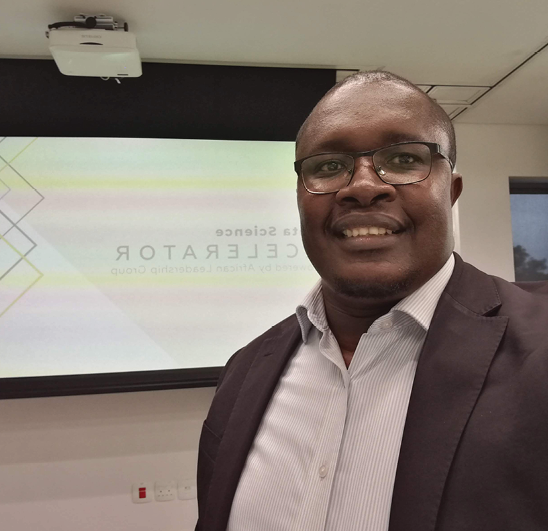
Digital start-up MathsGee has teamed up with various libraries to help them become digitised.
MathsGee, an online education support platform, provides real-time support to learners through a question-and-answer platform.
The company’s founder and CEO Edzai Zvobwo says it has started a citizen-led extension of the platform to help libraries better engage the public.
“As a pilot, we independently created sites for Tshwane, Ekurhuleni and Johannesburg, which will help them offer a dedicated ‘Ask a Librarian’ functionality.
“We targeted libraries due to my personal experience of not being able to get answers without physically going to a library to ask a librarian to assist me,” says Zvobwo.
The ‘Ask a Librarian’ function enables users to ask specific libraries questions, via their mobile device. The questions are routed to librarians, who can respond in real time.
“The platform is designed for constructive knowledge sharing. Before someone asks a question, they can see if it has already been asked and if an answer has been provided. This avoids duplication and saves librarians’ time,” he says.
While the pilot sites are still in the testing phase, the platform is zero-rated and free to use, with major costs covered by MathsGee.
“We are using an ad-based model and testing a ‘tip jar or sponsor’ button that will enable users who answer questions to get a ‘tip’. MathsGee will get five percent of the amount sponsored,” says Zvobwo.
He sees this as an opportunity for students who are struggling financially to earn some money.
“This is the new world. It is how open source knowledge sharing is being funded.”
Zvobwo adds that GitHub, Reddit, YouTube and other open platforms have all recently introduced ‘tip jar or sponsor’ functionality to thank creators.
“I would like to commend the departments of health, higher education and training, and basic education for crafting the world’s largest telco-led intervention through the zero-rating of education websites.
“Over 1 000 sites have been zero-rated by various mobile network operators. We want to achieve this and more with libraries,” he says.
For more information, go to https://joburg-libraries.mathsgee.com or https://mathsgee.com.
Organic waste project to free up landfills
Organic waste project to free up landfills UrsulaThe City of Cape Town has launched a pilot project to divert organic food waste from landfills and is calling on the public to participate. 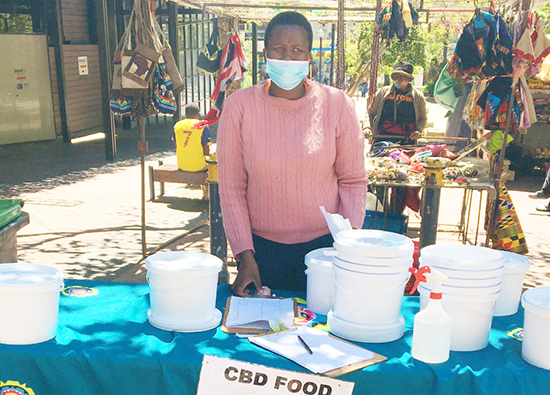
According to the city’s Mayoral Committee Member for Water and Waste, Alderman Xanthea Limberg, South Africa faces significant challenges relating to food loss and waste, with an estimated 12.6 million tonnes of food wasted in the country every year.
National and provincial government have responded to this challenge by setting a provincial target of 50% diversion of organic waste from landfills by 2022 and 100% diversion by 2027.
The trial food waste diversion project operates from four city drop-off sites and four pop-up sites in various central business districts in Cape Town, including the city centre, Claremont, Durbanville and Somerset West.
Participants are given an information leaflet and a five-litre bucket, which they take home to fill with food waste and store in their fridge.
When the bucket is full, they return it to the site where it is decanted, cleaned and given back to the participant. The food waste is then taken to a city solid waste facility to be weighed and composted.
“To date, between 50 and 100 residents across the eight sites have registered for the programme and over 430 buckets have been handed out,” says Limberg.
Marcela Guerrero Casas (41), one of the participants, was thrilled to hear about the programme.
“This has always been a challenge, not only in Cape Town, but in other cities too. It is clear that we have a global organic waste problem. This matters because organic waste in landfills produces methane, which contributes to climate change," he says.
The trial started on 15 February and runs until 30 June, when the city will evaluate its effectiveness.
For a list of drop-off and pop-up sites and operating hours, email re.cycling@capetown.gov.za.
Acceptable organic waste that can be placed in the buckets includes:
- Fruit and vegetable scraps and peels.
- Eggshells, egg trays and tea bags.
- All food scraps such as starch (rice, pasta and pap), sauce, meat, bones.
- Paper plates and serviettes.
- Compostable food containers.
Poultry farmers aren’t chicken!
Poultry farmers aren’t chicken! UrsulaA group of unemployed poultry farmers have secured their future by forming a cooperative. 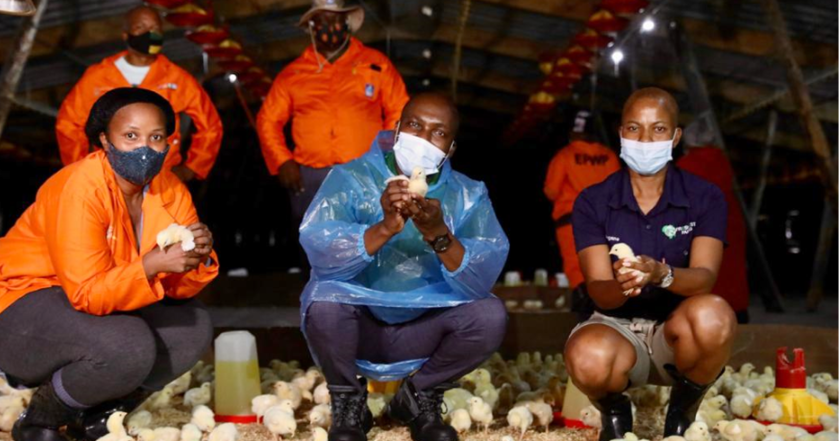
Retrenched poultry farmworkers in KwaZulu-Natal (KZN) have come together to start a poultry cooperative, after being left with no means to earn a living.
The Cato Ridge Chicken Farm in Hammarsdale has inspired many farmworkers to use the skills they learnt when they were employed to start their own business.
The workers were left jobless in 2017 when RCL Foods, which owns Rainbow Chickens, sold 15 of its 25 farms. This resulted in a loss of 1 350 jobs. Of these workers, 129 came together to form the Isukile Agricultural Cooperative, which started operating in December 2020.
The cooperative now has 7 500 chickens, but has space to expand to house 34 000.
Nonhle Mdunge from the cooperative says things are going well, as it sold its first batch of 7 500 chickens in a month.
“We supply our chickens to informal traders in our community and in Pietermaritzburg and surrounding communities. We want to expand, as there are stores and restaurants that want big orders, but we can’t meet the demand,” she says.
Realising the cooperative’s potential, the eThekwini Municipality has decided to assist.
eThekwini Mayor Mxolisi Kaunda says the municipality supports agriculture and associated industries to fight job losses and unemployment. “The municipality could not sit back and fold its arms while several families lost their livelihoods.”
The municipality plans to develop the farm into an agri-park incubator, which will create 103 jobs. It also wants to start a farming sheep operation, to create opportunities for about 48 small, medium and micro enterprises.
The sheep unit installation began this month and should be complete by July. “In the first phase, four sheep units will operate, accommodating 1 000 sheep each. The first phase will create approximately 16 jobs,” says Mayor Kaunda.
The municipality and the KZN Department of Economic Development, Tourism and Environmental Affairs have invested about R18 million to assist the cooperative with facilities and tools, and R4 million to buy a farm.
Remembering Charlotte Mannya Maxeke
Remembering Charlotte Mannya Maxeke UrsulaStruggle stalwart Charlotte Maxeke was a trailblazer who chose to walk in many an uncharted territory. 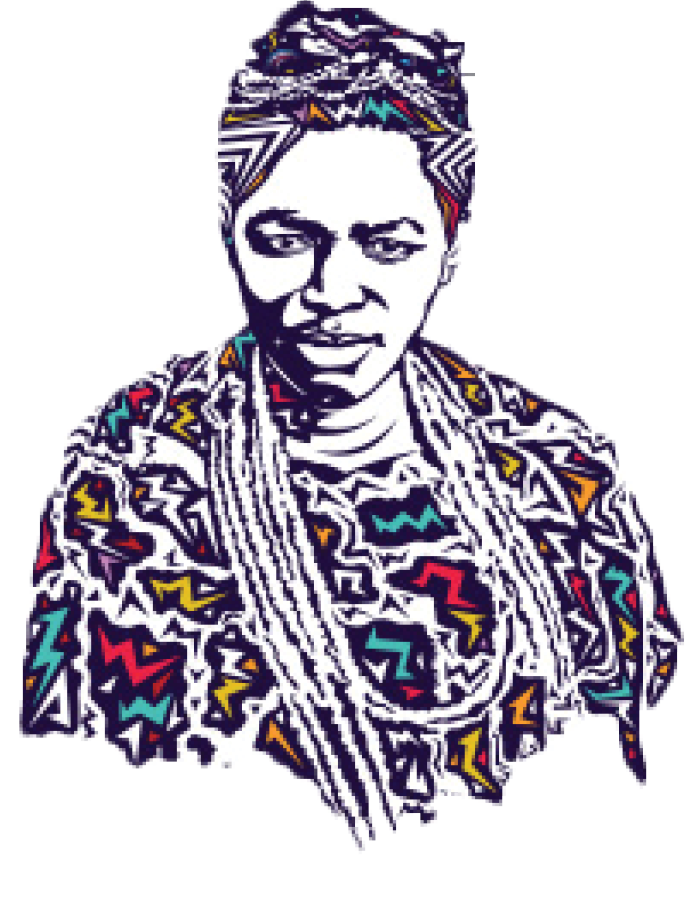
She was the first black woman to graduate and obtain a BSc Degree in Southern Africa in 1901.
“Some have even tended to refer to her as a woman of many firsts. Until her remarkable feat at Wilberforce University in Ohio, in the United States, no black woman had obtained a degree on our shores,” said Minister of Sport, Arts and Culture Nathi Mthethwa.
He was speaking at the launch of The Year of Charlotte Mannya Maxeke recently.
Government has declared 2021 as “The year of Charlotte Mannya Maxeke.” This year marks 150 years since her birth.
She will become the second woman to be memorialised and honoured in this way. In 2018, struggle icon Albertina Sisulu was honoured in a similar manner.
Maxeke had an impact in many areas, including education, faith and politics.
“When the African intelligentsia, faith and traditional leaders met to form what was later to be known as the African National Congress (ANC) way back in 1912, uMama Maxeke was the lone brave female voice in that conference.
“She held her head high and made a contribution, undeterred by perceptions and societal norms that sought to relegate women to subservient roles in society,” said the Minster.
Maxeke is counted as one of the first women to establish a school.
The Minister announced a number of events to honour Maxeke. These include:
- The Department of Women will erect a bust in honour of Maxeke. Plans are in place to have this bust unveiled at the local AME Church in Botlokwa, Limpopo.
- The Department of Sport, Arts and Culture, through its Heritage Promotion and Preservation Branch, has already started exploratory work into mounting a statue of Maxeke.
- There is ongoing work on the promotion of African filmmaking through the National Film and Video Foundation. This year the project will be dedicated to Maxeke, as part of preserving her legacy, and in highlighting the role of women in this industry.
Social Development Minister Lindiwe Zulu said her department will work with the Charlotte Mannya-Maxeke Institute on some activities, with the focus on raising awareness of gender-based violence and femicide in the 30 hotspot areas. - SAnews.gov.za
Robust media more critical than ever
Robust media more critical than ever vuyelwanWe live in a country where not just journalists but any member of the public is able to freely articulate their views, their opinions and indeed their dissatisfaction without fear of retribution.
We have come a long way from the days where social protest by artists attracted banning orders, and critical reporting by journalists risked imprisonment or the closure of publications.
Recently, the organisation Reporters without Borders published the 2021 World Press Freedom Index, a barometer of the state of media freedom across the globe.
Overall, it was found that there has been a decline in public access to information and an increase in obstacles to news coverage in a number of countries.
The report said that journalism is “totally blocked or seriously impeded” in 73 countries and “constrained” in 59 others. 
What is worrying is that media freedom has deteriorated under the COVID-19 pandemic, with the various restrictions put in place having seemingly been used to curtail media activity in several places.
In this latest report South Africa ranked 32nd out of 180 countries. The index describes the state of media freedom in South Africa as “guaranteed but fragile”.
It notes that while the South African Constitution protects freedom and we have an established culture of investigative journalism, a number of impediments still hinder journalists in the performance of their duties.
This includes legal injunctions against taking images of National Key Points or reporting on matters involving state security.
The report also notes an increase during 2020 of the intimidation of journalists, especially female journalists on social media.
Such intimidation is totally unacceptable, but is particularly harmful when it is directed at female journalists and is occasionally accompanied by threats of sexual violence. This is a matter of great concern and cannot be allowed.
At the same time, we take great comfort in the knowledge that we have a free, robust media that is able to report without fear or favour about those in power, about the most pressing social issues of our time, and to provide accurate, impartial information to the public.
At a time when we are working together to rebuild our economy and our society in the midst of the Coronavirus pandemic, a robust media is more critical than ever.
The South African media has played a pivotal role in uncovering much of what we know today about the true extent of capture of the state by self-serving, corrupt individuals and entities.
They sustained their reporting even in the face of intimidation, disinformation and attacks on their person.
Corruption is by no means the only challenge we face as a country. The daily lives of many South Africans are still affected by poverty, inequality and underdevelopment, poor service delivery and lack of access to opportunities.
If the media is to remain true to its responsibility to support democracy, our journalists must continue to report without fear or favour on the other issues of the day.
Their sustained coverage must include gender-based violence, crime in our communities and social ills like substance abuse.
Our media should provide accurate and impartial information, enabling the public to make informed decisions, to access opportunities and to improve their lives.
They should continue to produce journalism that goes beyond the headlines and front pages and that contributes to human development.
They should report both the good news and the bad news, the progress we make and the challenges we face.
Credibility is key to sustaining trust between journalists and the public.
When journalists allow themselves or their platforms to be used to fight political battles or settle scores on behalf of vested interests, their credibility suffers.
When media disseminate stories that are inaccurate or that they know to be false, the public loses faith in them.
It is in the best interests of all who love this country and wish for it to succeed that our media is supported, and not hindered in its work.
As a society, let us continue to work together to jealously safeguard our country’s media freedom. It was hard won and without it, we cannot hope to flourish.
Support for SA’s youth
Support for SA’s youth UrsulaGovernment has launched the National Youth Policy 2020-30 (NYP 2030), which is aimed at producing positive youth development outcomes for young people at local, provincial and national level. 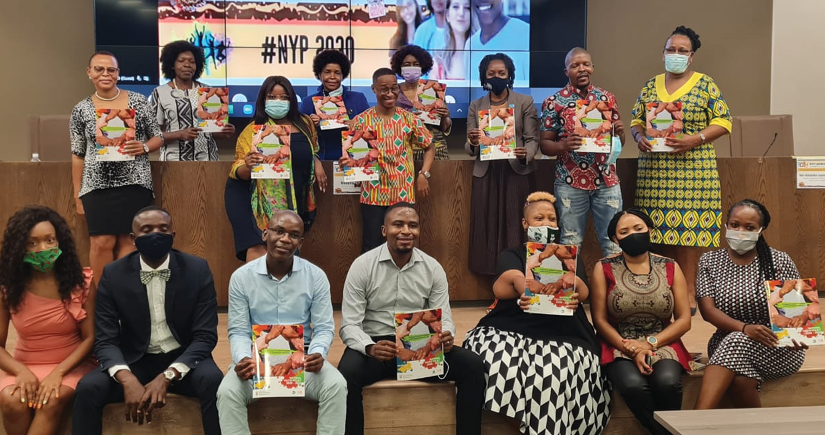
The policy comes after more than year-long consultations with various government departments, agencies and the young people who stand to benefit from it.
It proposes interventions for the development of youth and focuses on investing in the capabilities of the youth to transform the country's economy.
The launch of the policy is the first step in popularising and distributing it to all roleplayers, including government and its partners in business, civil society and young people.
Minister in the Presidency for Women, Youth and Persons with Disabilities Maite Nkoane-Mashabane said the policy is ready for implementation.
She urged government, civil society and the private sector, who are expected to implement the policy, to constantly refer to the document for guidance on the programmes and projects the youth are expecting from the government.
“We are to translate what is contained in the policy document into tangible actions. The policy has promises that represent change the youth of South Africa have been yearning for, for years, to rid themselves from poverty, unemployment and inequality,” she said.
Minister Nkoane-Mashabane said the youth were severely affected by the Coronavirus pandemic and action must be taken to help them secure a brighter future.
“Our role must be to ensure that a young girl moves out of the kitchen to be a decision maker in the board room; a young man stops wandering in the streets of a township and instead goes into gainful employment as a successful entrepreneur, and our youth with disabilities need to instil hope in their able-bodied counterparts,” she said.
The NYP 2030 has five priority areas:
- Quality education, skills and second chances.
- Economic transformation, entrepreneurship and job creation.
- Physical and mental health promotion.
- Social cohesion and nation building.
- Effective and responsive youth development machinery.
For more information on the NYP 2030 or to download the document, go to www.gov.za
TVET college shapes make-up artist’s career
TVET college shapes make-up artist’s career UrsulaFurthering your studies at a technical and vocational education and training (TVET) college can land you on the path to a successful career. 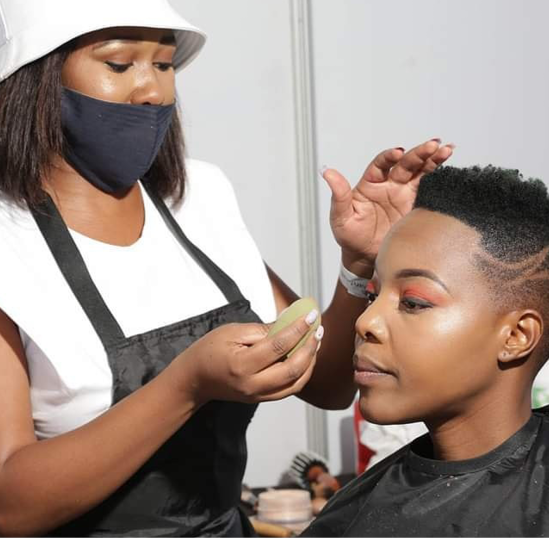
You don’t have to study at a university to secure your future as furthering your studies through a TVET college will help you gain valuable skills.
Government has been encouraging youth to consider enrolling at TVET colleges, to gain the skills needed to address the skills gaps in the economy.
Celebrity make-up artist and businesswoman Amanda Nyoka (31) is putting the skills she learnt at a TVET college to good use.
Nyoka, who was born in Uitenhage and grew up in Addo in the Eastern Cape, obtained a marketing diploma from the Eastcape Midlands TVET College in 2011.
She is the founder and owner of beauty business Amish Beauty and Glam and skincare range Amish Healthy Skin, and uses her skills to market her brand and grow her business.
“You need to take anything you do seriously if you want to succeed. It does not matter where you study, whether it’s at a TVET college or university,” says Nyoka.
“The best thing about studying at a TVET college is that you are taught theory and practical work, which helps you to acquire the skills you need in the workplace,” she adds.
The self-taught beautician drew inspiration to start her business from her financial struggles.
“I volunteered at Bay TV’s make-up department in 2013, but I needed an income so started doing make-up for weddings and parties.
“I posted my work on social media and, because I’m good at what I do, people supported me. I never looked back.”
Nyoka also completed a film and television production course at Feline Technology in 2015.
In 2017, she registered Amish Beauty and Glam, which specialises in make-up, hairstyling, nails and wardrobe styling for television, weddings, functions and special occasions.
Through the business, she has done many celebrities’ make-up, including Zandile Khumalo, Busiswa, Zahara and Deborah Fraser.
Her Amish Healthy Skin range is the result of an experiment.
“I like doing research and learning things on my own. I started mixing my own butter for my body and hair and I’ve always been interested in organic oils. That’s how I started making body lotion, which I turned into a business.”
Nyoka has dreams of owning a workshop to manufacture more products. Her product range already includes tissue oil, body lotion, face cream and face serum oil.
There are 50 registered and accredited public TVET colleges in the country. For more information or to enrol at your nearest TVET college, go to www.tvetcolleges.co.za
Technology to speed up disability grant applications
Technology to speed up disability grant applications vuyelwanSASSA and GovChat have launched a pilot system to improve service delivery to disability grant applicants.
Visiting the South African Social Security Agency’s (SASSA) offices multiple times and waiting in long queues to apply for a disability grant will soon be a thing of the past.
This is thanks to a new online system that will enable applicants to book their medical assessment from the comfort of their own home.
Social Development Minister Lindiwe Zulu recently launched the pilot phase of SASSA’s disability grant medical assessment booking system in Cape Town. The system will be piloted regionally before being rolled out nationally. 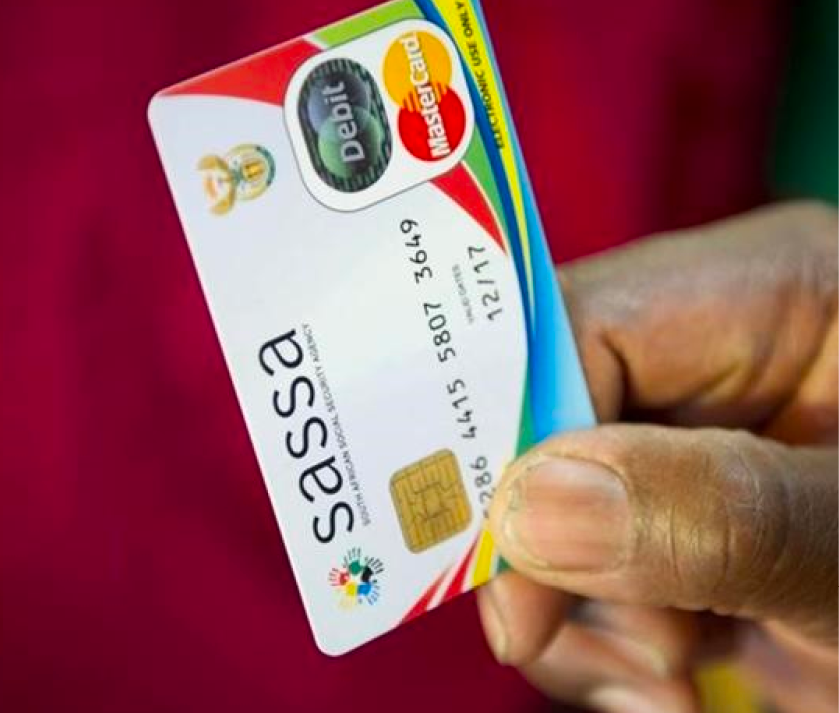
Using the new system, disability grant applicants will be able to download forms and book their medical assessment online.
“The online booking system forms part of SASSA’s strategy to improve its services through the efficient use of digital technology,” says Minister Zulu.
Cost savings
The system will also cut down on the amount of time the application process takes and will ensure cost savings for SASSA and the applicants, she adds.
Minister Zulu explains that during the current application process for a disability grant, the applicant needs to visit their local SASSA office about three times.
“The online booking system will significantly reduce the number of visits to the SASSA contact points – excluding a visit to a medical assessment site or health facility – from three to one.”
This is because the booking system not only allows applicants to complete their application form, but also enables them to book a date and time for their medical assessment.
Once they have registered their medical assessment appointment on the system, they can choose their preferred clinic or hospital.
Depending on the availability of the documentation required, the application may be completed at the first visit, saving both SASSA and clients time and money.
“I have no doubt that the system will simplify the assessment process for persons with disabilities, reducing the need to submit information multiple times and the number of face-to-face assessments,” says the Minister.
The disability grant reaches 997 000 beneficiaries monthly and is the third largest grant after the old age grant and child support grant.
“Online booking will thus also address challenges associated with long queues at local offices and ensure that SASSA complies with Coronavirus (COVID-19) regulations,” she adds.
Collaboration with GovChat
Government’s official citizen engagement platform GovChat has been working with SASSA over the past year to assist the agency with the COVID-19 social relief of distress grant.
This partnership has assisted over 4.9 million people who applied for the grant digitally and didn’t have to stand in long queues.
The new online disability grant booking system integrates with SASSA’s Electronic Medical Assessment Statistics Template system, enabling local offices to create an electronic schedule.
Applicants can access the system from their cellphone or computer to make a booking for a medical assessment.
The booking system is linked to the available doctor’s schedule at the applicant’s selected healthcare facility.
Applicants can also download the forms that they need to complete as part of the application process.
Once a medical assessment booking has been made, the applicant will receive an SMS confirming their medical assessment date, time and venue.
They can also enquire online about their booking and screening outcome information and which documents to complete, cancel their appointment due to unforeseen circumstances and rebook an alternative date.
GovChat Chief Executive Officer Eldrid Jordaan says GovChat and SASSA aim to jointly tackle the challenges that the most vulnerable experience.
“Over the past year we have seen the important role that fit-for-purpose technology can play in assisting the most vulnerable to get quality service from government,” he says.
Special grant ends
The COVID-19 social relief of distress grant came to an end on 30 April, with no new applications being accepted after this date.
However, all applicants that were approved but had not yet received the grant will still be paid.
Those whose applications were declined for February to March 2021 can appeal the decision by going to https://SRD.sassa.gov.za and follow the links. If you do not appeal, the declined application will not be reconsidered. The appeal period closes on 31 May 2021.
For more information and to access the disability grant medical assessment booking system, go to www.sassa.gov.za/Pages/Disability-Grant.aspx
Tobacco addiction: Your health could go up in smoke
Tobacco addiction: Your health could go up in smoke vuyelwanTo commemorate World No Tobacco Day on 31 May, Vuk’uzenzele chats to a recovering tobacco addict about overcoming his addiction.
Katlego Makhanda, from Moiletswane in the North West, knows all too well how hard it is to stop smoking.
Until he stopped four years ago, Makhanda (28) used to smoke over 30 cigarettes a day.
He started smoking when he was 18 as a result of peer pressure. 
“I was not interested in smoking – it didn’t appeal to me until I was in matric and a group of guys I used to hang out with started picking on me for not being cool enough to smoke.”
Makhanda initially smoked one or two cigarettes a day, but this increased over time.
“After matric, I went to varsity and the freedom that came with not staying with my parents meant I could drink alcohol as frequently as I wanted. This increased my rate of smoking.”
In 2017, Makhanda fell ill and was hospitalised. He was diagnosed with type 2 diabetes and for weeks was too weak to get out of bed.
“The doctor was very specific that managing my illness couldn’t be done if I continued to smoke. That is when I decided to quit for good.”
Dr Midah Maluleke from Mpumalanga says smoking is harmful to nearly every organ.
“Illnesses such as cancer, heart disease, stroke, lung diseases, diabetes and chronic obstructive pulmonary disease can result from smoking.
“Research shows that smokers are 30% to 40% more likely to develop type 2 diabetes than non-smokers. Smoking also creates difficulty in managing the disease,” he says.
Tips to stop smoking
The Cancer Association of South Africa (CANSA) offers the following tips if you are trying to stop smoking:
Decide on a date to stop smoking and then do it.
Throw away everything that reminds you of smoking. This includes cigarette packets, ashtrays, lighters.
Drink lots of water – it will help flush the nicotine from your body.
Inform your family and friends that you are trying to stop so that they can support you.
You may experience some dizziness, headaches or coughing once you have stopped smoking. This is normal and should improve after a day or two and disappear within 14 days.
Makhanda says his journey hasn’t been easy, but he is committed to not smoking.
“The local clinic and staff provided me with support and information on the importance of living a tobacco-free life. At first, the smell of cigarette smoke was tempting, but now I’m used to it,” he adds.
For help to stop smoking, visit your local clinic or contact CANSA at 0800 22 66 22.
Training programme uplifts youth
Training programme uplifts youth UrsulaThe Western Cape government is assisting unemployed youth to find experiential learning opportunities. 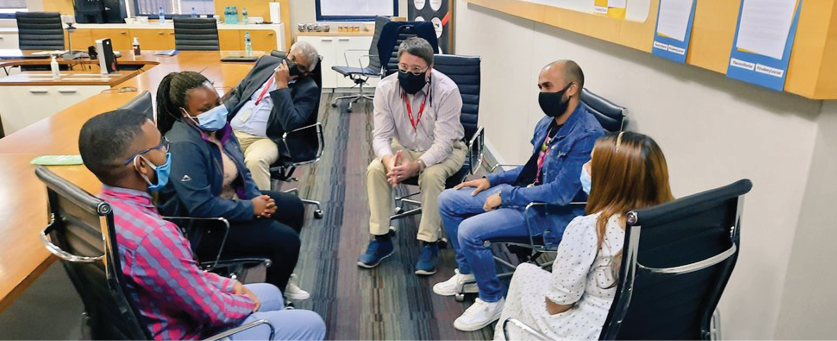
The Western Cape Department of Economic Development and Tourism has secured 1 166 full-time jobs for youth who have completed its Work and Skills Training Programme.
A further 534 older people also took part in the programme and they too have been offered full-time contracts with companies in the province’s business process outsourcing (BPO) sector.
Finance and Economic Opportunities MEC David Maynier says in addition to the training programme, the department has allocated R98.82 million over the medium term to provide 3 000 unemployed youth with experiential learning opportunities in the BPO sector.
BPO work involves front office customer services, such as marketing, human resources, accounting and tech support, and back office business functions, such as purchasing and billing.
South Africa is one of the globally preferred countries for BPO services.
In the recent Ryan Strategic Advisory Front Office BPO Omnibus Survey, South Africa was voted as the most favoured offshore BPO destination in 2021.
The programme partners with government, civil society and business to create experiential learning and work placement opportunities for unemployed youth in the Western Cape.
Participants, who are between the ages of 18 and 35, are paid stipends of between R3 000 and R3 500 to support work placements of between four and 12 months. They receive on-the-job training in critical skills areas.
MEC Maynier recently visited WNS, a global BPO company in Cape Town, where 234 youth were offered permanent work placements.
“It was great to hear directly from these young people how the programme has changed their lives, prepared them with necessary technical and soft skills for the workplace and given them hope by providing them with permanent jobs,” he said.
The high level of unemployment among school graduates with good communication skills offers a significant talent supply opportunity to global players in the BPO sector, the MEC added.
“We have seen an exceptionally high up-take of young people moving into permanent employment following their work placements in the BPO sector,”
he said.
To find out more about the Work and Skills Training Programme contact the department at 021 483 9226.
Your guide to the Electronic Vaccination Data System (EVDS)
Your guide to the Electronic Vaccination Data System (EVDS) vuyelwanCitizens aged 60 years and above needs to register for their COVID-19
Vaccination through the EVDS self enrolment platform
6 steps to register for vaccination if you are 60 years or older:
Step 1
Make sure you have internet access
Step 2
You will need a smartphone, a tablet or a computer
Step 3
Connect to the internet and go to: https://vaccine .enroll.health.gov.za/#/
Step 4
The welcome screen will tell you what to do next
Step 5
Follow the instructions put in all the details the system asks for
Step 6
When you are done the system will send an SMS to the phone number you provided.
This SMS will tell you that you are registered. This means that the system now has you in the queue.
When it is your turn to be vaccinated, the system will send you another SMS with the date and the venue for your vaccination.
If you put in the correct address, you will be sent to be vaccination centre that is closest to you home.
#IChooseVacciNation
Should you encounter problems during the registration process contact the COVID hotline 0800 029 99